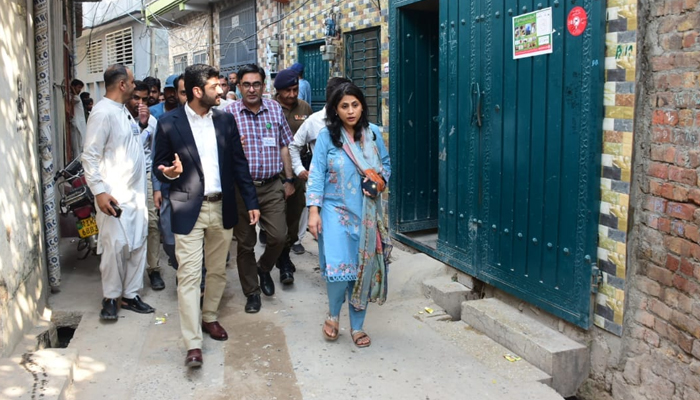DC urges collective efforts to reduce dengue morbidity
Rawalpindi:Deputy Commissioner (DC) Rawalpindi Hasan Waqar Cheema on Monday stressed for collective efforts to control dengue morbidity in the city by mutual cooperation between the health department and the citizens.
He underlined the need to further accelerate the entomological surveillance and cognising the local population for adopting dengue SOPs to contain larva production. The deputy commissioner while appreciating the coordinated efforts of the health department said that the comparative analysis of the dengue statistics proved that considerable decline in positive cases has been seen in the year 2024. Addressing to a press conference at his office along with Dr. Asif Arbab Niazi, CEO District Health Authority, Hasan Waqar reiterated the commitment to keep on focusing on the dengue endemic vigilante in Rawalpindi on the instructions of CM Maryam Nawaz Sharif.
Giving statistical details, he informed the media that 710 dengue cases have been reported in Rawalpindi in 2024, which were 859 in the previous year. He informed that 3,000 cases have been registered, 1100 places have been sealed while a fine of Rs14.9 million have been imposed this year for violation of dengue SOPs. He said that compared to previous years, we have fewer teams this year, yet the statistics of dengue activity are high.
He further informed that during indoor surveillance, 40,2,33 houses were checked and larvae were recovered from 43,000 thousand houses, while 1100,000 places were checked in outdoor surveillance, in which larvae were recovered from 4,644 places. “50 clinics were sealed which were not reporting the patients regarding dengue to the concerned authorities, operation against quacksalver is also going on,” he informed. The deputy commissioner while highlighting the causes of the recent dengue outbreak, said that 200 mm of rainfall was recorded in the month of August this year which led to an increase in dengue cases.
He said that 1,400 teams were working on dengue surveillance. Underlining the need for joint efforts, Hassan urged the citizens to cooperate the government in defeating dengue endemic by exercising their self-responsibility to take dengue preventive measures. “Citizens should provide their support, and help the government to control dengue,” he said.
He also urged media representatives to provide their support in raising awareness about dengue. For creating massive awareness, he added that announcements were also being made in mosques regarding dengue in high risk union councils. Moreover dengue awareness seminars, dengue walks and holding zero periods in schools were also going on, he added.
Responding to media queries, the deputy commissioner informed that the district had 300 beds capacity in allied hospitals out of which 150 beds were currently occupied. “However, the number of beds will be increased to 1,000 if necessary,” he said. He clarified that there was no shortage of medicine in government hospitals for dengue patients. Work on proposals to conduct dengue tests at lower rates is also under consideration.
He informed that the surveillance teams have been tasked to check the government buildings every three days, weekly certificates were being taken by all government departments regarding cleanliness and absence of larvae. “Action will be taken if larvae are found in government buildings,” he said.
-
 50 Cent Gets Standing Ovation From Eminem In New 'award Video'
50 Cent Gets Standing Ovation From Eminem In New 'award Video' -
 Bad Bunny Delivers Sharp Message To Authorities In Super Bowl Halftime Show
Bad Bunny Delivers Sharp Message To Authorities In Super Bowl Halftime Show -
 Prince William 'worst Nightmare' Becomes Reality
Prince William 'worst Nightmare' Becomes Reality -
 Thai School Shooting: Gunman Opened Fire At School In Southern Thailand Holding Teachers, Students Hostage
Thai School Shooting: Gunman Opened Fire At School In Southern Thailand Holding Teachers, Students Hostage -
 Britain's Chief Prosecutor Breaks Silence After King Charles Vows To Answer All Andrew Questions
Britain's Chief Prosecutor Breaks Silence After King Charles Vows To Answer All Andrew Questions -
 Maxwell Could Get 'shot In The Back Of The Head' If Released: US Congressman
Maxwell Could Get 'shot In The Back Of The Head' If Released: US Congressman -
 New EU Strategy Aims To Curb Threat Of Malicious Drones
New EU Strategy Aims To Curb Threat Of Malicious Drones -
 Halle Berry On How 3 Previous Marriages Shaped Van Hunt Romance
Halle Berry On How 3 Previous Marriages Shaped Van Hunt Romance -
 Facebook Rolls Out AI Animated Profile Pictures And New Creative Tools
Facebook Rolls Out AI Animated Profile Pictures And New Creative Tools -
 NHS Warning To Staff On ‘discouraging First Cousin Marriage’: Is It Medically Justified?
NHS Warning To Staff On ‘discouraging First Cousin Marriage’: Is It Medically Justified? -
 Andrew Mountbatten-Windsor Flew Money In Suitcases To Launder: New Allegation Drops
Andrew Mountbatten-Windsor Flew Money In Suitcases To Launder: New Allegation Drops -
 Nancy Guthrie Abduction: Piers Morgan Reacts To 'massive Breakthrough' In Baffling Case
Nancy Guthrie Abduction: Piers Morgan Reacts To 'massive Breakthrough' In Baffling Case -
 Adam Mosseri Set To Testify In Court Over Social Media Addiction Claims
Adam Mosseri Set To Testify In Court Over Social Media Addiction Claims -
 Will Warner Bros Finalize Deal With Paramount Or Stays Loyal With Netflix's Offer?
Will Warner Bros Finalize Deal With Paramount Or Stays Loyal With Netflix's Offer? -
 Palace Spotlights Queen Camilla For Her Work With Vision-impaired Children A Day After Andrew Statement
Palace Spotlights Queen Camilla For Her Work With Vision-impaired Children A Day After Andrew Statement -
 Kim Kardashian Still 'very Angry' At Meghan Markle, Prince Harry
Kim Kardashian Still 'very Angry' At Meghan Markle, Prince Harry




